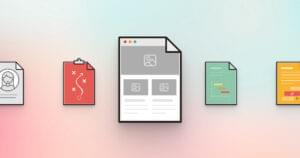 We know that a résumé is essentially a tool to get you in the door for an interview, a meeting or some other targeted opportunity. It outlines your education and experience, and it can be your first impression on a potential boss or colleague. Most of us have used one at some point in our careers.
We know that a résumé is essentially a tool to get you in the door for an interview, a meeting or some other targeted opportunity. It outlines your education and experience, and it can be your first impression on a potential boss or colleague. Most of us have used one at some point in our careers.
But if you’re a full-time freelancer or business owner, do you need to bother with a résumé? The answer is yes and no.
When You May Need a Résumé
When you’re in business for yourself, it typically becomes more important to provide examples demonstrating proven experience, relevant successes, and client references. A résumé is not really the best format to do that; see below for some ways you can modify a résumé format to suit your needs as an entrepreneur.
Then what are some situations when you may need to dust off and revise your résumé? Here are some possibilities:
- You are going back to work for someone else.
- You are applying for membership in a professional organization.
- You are applying for an industry-specific certification.
- You are applying as a presenter or exhibitor at a conference.
- You are bidding on a job with a large company or organization.
How to Include Freelancing on a Résumé
If you’re in the I-need-a-résumé group, you will need to incorporate your freelancing or business ownership endeavors with any other experience you may have.
As a business owner, you can simply include your company information along with the rest of your experience. You can also go into a little detail about the type of work you do, if you manage a team, and the type of clients you’ve worked with.
As a freelancer, it gets a bit trickier, especially if you have worked with a number of businesses for short-term projects. You want to avoid giving the employer the impression that you are just including freelancing to fill a chronological hole during a time when you were unemployed.
The best way to do this is by identifying each company you’ve worked with and list your title as Freelancer. You can also include a brief description of the work you did if it’s relevant. It’s also a good idea to include some of your freelancing clients as references, if you are asked to provide them.
I should also note that in many cases where you’re applying for membership or certification, you may be asked to provide a Curriculum Vitae (CV). A CV is basically a souped-up résumé; it’s longer and includes a lot more information than a standard resume. For more information on writing a CV, see this Curriculum Vitae Guide on About.com.
Alternatives to a Traditional Resume
As a business owner, I do occasionally get asked for a résumé, but it’s infrequent and almost always another format makes more sense. Many times a client simply doesn’t know what to ask for to validate your experience, and it’s up to you to provide them with the information they need to make a decision.
Here are some ways, other than a traditional résumé, that you can present your background and experience to a potential client:
- Website – Your about page should give a client enough information to understand who you are and what you do. Combined with your portfolio, this can be a powerful sales tool.
- Brochure – You can create a printed or electronic document for the sole purpose of giving your clients a way to get to know you. It can include a bio, some case studies, frequently asked questions, a picture, and even a little personal information.
- Audio/Video – Consider creating an audio or video biography to give clients an even better idea of who you are. Seeing your face and hearing your voice can make a client more likely to trust (and hire) you.
Do you maintain a résumé? Does it help you get more work?
Image credit: magurka
Alyssa Gregory is a digital and content marketer, small business consultant, and the founder of the Small Business Bonfire — a social, educational and collaborative community for entrepreneurs.

